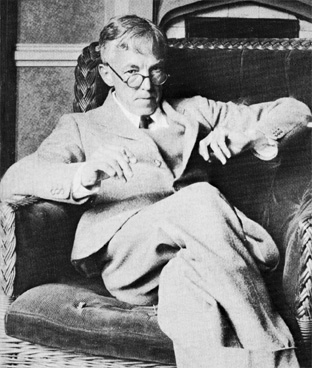
G. H. Hardy
Godfrey Harold Hardy FRS[1] (7 February 1877 – 1 December 1947)[2] was an English mathematician, known for his achievements in number theory and mathematical analysis.[3][4] In biology, he is known for the Hardy–Weinberg principle, a basic principle of population genetics.
G. H. Hardy
1 December 1947 (aged 70)
British
Fellow of the Royal Society[1]
Smith's Prize (1901)
Royal Medal (1920)
De Morgan Medal (1929)
Chauvenet Prize (1932)
Sylvester Medal (1940)
Copley Medal (1947)
G. H. Hardy is usually known by those outside the field of mathematics for his 1940 essay A Mathematician's Apology, often considered one of the best insights into the mind of a working mathematician written for the layperson.
Starting in 1914, Hardy was the mentor of the Indian mathematician Srinivasa Ramanujan, a relationship that has become celebrated.[5] Hardy almost immediately recognised Ramanujan's extraordinary albeit untutored brilliance, and Hardy and Ramanujan became close collaborators. In an interview by Paul Erdős, when Hardy was asked what his greatest contribution to mathematics was, Hardy unhesitatingly replied that it was the discovery of Ramanujan.[6] In a lecture on Ramanujan, Hardy said that "my association with him
is the one romantic incident in my life".[7]: 2
Early life and career[edit]
G. H. Hardy was born on 7 February 1877, in Cranleigh, Surrey, England, into a teaching family.[8] His father was Bursar and Art Master at Cranleigh School; his mother had been a senior mistress at Lincoln Training College for teachers. Both of his parents were mathematically inclined, though neither had a university education. He and his sister Gertrude "Gertie" Emily Hardy (1878–1963) were brought up by their educationally enlightened parents in a typical Victorian nursery attended by a nurse. At an early age, he argued with his nurse about the existence of Santa Claus and the efficacy of prayer. He read aloud to his sister books such as Don Quixote, Gulliver's Travels, and Robinson Crusoe.[1]: 447
Hardy's own natural affinity for mathematics was perceptible at an early age. When just two years old, he wrote numbers up to millions, and when taken to church he amused himself by factorising the numbers of the hymns.[9]
After schooling at Cranleigh, Hardy was awarded a scholarship to Winchester College for his mathematical work. In 1896, he entered Trinity College, Cambridge.[10] After only two years of preparation under his coach, Robert Alfred Herman, Hardy was fourth in the Mathematics Tripos examination.[11] Years later, he sought to abolish the Tripos system, as he felt that it was becoming more an end in itself than a means to an end. While at university, Hardy joined the Cambridge Apostles, an elite, intellectual secret society.[12]
Hardy cited as his most important influence his independent study of Cours d'analyse de l'École Polytechnique by the French mathematician Camille Jordan, through which he became acquainted with the more precise mathematics tradition in continental Europe. In 1900 he passed part II of the Tripos, and in the same year he was elected to a Prize Fellowship at Trinity College.[1]: 448 In 1903 he earned his M.A., which was the highest academic degree at English universities at that time. When his Prize Fellowship expired in 1906 he was appointed to the Trinity staff as a lecturer in mathematics, where teaching six hours per week left him time for research.[1]: 448 In 1919 he left Cambridge to take the Savilian Chair of Geometry (and thus become a Fellow of New College[13]) at Oxford in the aftermath of the Bertrand Russell affair during World War I. Hardy spent the academic year 1928–1929 at Princeton University in an academic exchange with Oswald Veblen, who spent the year at Oxford.[3] Hardy gave the Josiah Willard Gibbs lecture for 1928.[14][15] Hardy left Oxford and returned to Cambridge in 1931, becoming again a fellow of Trinity College and holding the Sadleirian Professorship until 1942.[1]: 453
He was on the governing body of Abingdon School from 1922 to 1935.[16]
Cultural references[edit]
Hardy is a key character, played by Jeremy Irons, in the 2015 film The Man Who Knew Infinity, based on the biography of Ramanujan with the same title.[32] Hardy is a major character in David Leavitt's historical fiction novel The Indian Clerk (2007), which depicts his Cambridge years and his relationship with John Edensor Littlewood and Ramanujan.[33] Hardy is a secondary character in Uncle Petros and Goldbach's Conjecture (1992), a mathematics novel by Apostolos Doxiadis.[34] Hardy is also a character in the 2014 Indian film, Ramanujan, played by Kevin McGowan.